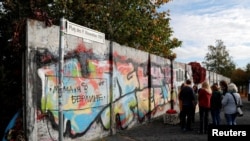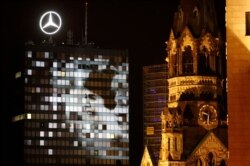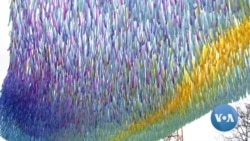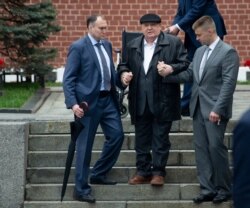Germany is preparing to celebrate the 30th anniversary of the fall of the Berlin Wall Saturday.
Built in 1961 by the Communist government of East Germany, the wall was meant to stop the flood of its citizens fleeing to the West. Hundreds were shot dead trying to run across the frontier. On the night of Nov. 9, 1989, tens of thousands of people breached the wall and tore it down, seen as a key moment in the demise of the Soviet Union.
Video projections, art displays and concerts have been taking place all week in the capital. Next to the Brandenburg Gate, which formed part of the frontier between East and West, American artist Patrick Shearn has installed a huge wave of colorful paper strands, bearing the handwritten messages from people across Germany.
Reagan's famous line
It was in front of the Brandenburg Gate in June 1987 that then U.S. President Ronald Reagan uttered his now infamous demand to his Soviet counterpart: “Mr. Gorbachev, tear down this wall.”
Two years later, Germans themselves tore down the wall in a dramatic show of people power that would have profound consequences for Germany, for Europe, and for the global order.
In the Soviet Union and Warsaw Pact countries, pressure had been building for months. The Solidarity trade union won dozens of parliamentary seats in Poland. There were mass protests in the Baltic States, and Hungary, forcing the partial opening of its border with Austria. Tens of thousands fled to the West.
Pro-democracy protests spread to Leipzig in East Germany, and then to East Berlin. On Nov. 9, the East German government held a televised press conference and said its citizens were now free to travel to the West.
WATCH: As Berlin Celebrates Wall Anniversary, Cold War Foes Rearm
The shock announcement was a bureaucratic slip, but East Germans flocked to the border. In the confusion, guards opened the gates. The Berlin Wall was breached without a shot being fired.
Patrick Hartwig, then 19 and living in East Berlin, was among the first through the gates. He went immediately to the Kurfürstendamm in the west of the city, a shopping district symbolic of Western capitalism. He now works on the same street.
“I spent the whole night on the Kurfürstendamm. I was sitting in a random BMW, a bottle of sparkling wine in my hand and we honked up and down the Kurfürstendamm and had a wild night. Thirty years later, I still think the changes were positive, it was a peaceful change,” Hartwig recalls.
Echoes around world
The events of that night echoed across the world as Berliners on both sides tore down the wall.
A few weeks later, Soviet leader Mikhail Gorbachev and new U.S. President George Bush announced the Cold War was over. It was a time of great optimism, says Professor Hermann Wentker of the German Institute of Contemporary History.
“It seemed as if things were getting more peaceful, that the world was getting to a more peaceful place. Some even said this was the end of history,” he said.
By 1991, the Soviet Union had crumbled. Communism had failed. But in the three decades since, tensions between East and West have re-emerged.
“NATO has taken in Poland, the Baltic states and so on, they (Russia) have seen this as a threat. Although of course, it wasn’t meant as a threat. It wasn’t an aggressive NATO, which sort of had a drive to the East, but it was the East European countries who applied for NATO membership,” Wentker says.
As the new century dawned, Vladimir Putin emerged as Russia’s strongman, pledging to rebuild the country’s pride and power. In Moscow, Wentker says the events of 1989 are viewed very differently three decades on.
“Gorbachev is now much less accepted than he was then. Because he is now seen not only as the person who gave away the GDR (East Germany) but also as the person who destroyed the Soviet Union. And Putin is, I think, essentially trying to regain part of this Soviet hegemonic position in Europe.”
In 2014 Russia forcefully seized Crimea and invaded eastern Ukraine. Relations between East and West have plunged as Russia and the United States rearm.
Konstantin Kosachev, head of the Russian Parliament’s Upper House Foreign Affairs Committee, blames the West for missed opportunities.
“I do not believe that the outcome of the Cold War may be considered in terms of somebody winning and somebody losing. It could have been a win-win situation, if only the Western countries should have been much wiser,” Kosachev said.
Germans and visitors from around the world will celebrate the anniversary Saturday, the night freedom came to Berlin. But peace between East and West has remained elusive.








